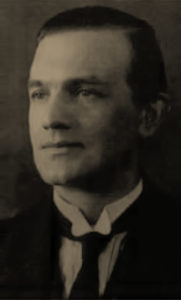
Charles Sitch
Charles Sitch was Thomas Sitch’s third son, born in 1887. He left school at the age of 13 and worked as an assistant in a grocer’s shop for five years. Despite having no formal qualifications, at the age of 18 Charles began a two-year course at Ruskin College, Oxford, studying economics, industrial organisation and economic history, supported by a Chainmakers’ and Strikers’ Association grant.
On leaving Ruskin College, he became the secretary of the hand-hammered chain branch of the NFWW. Charles was deeply involved in the agitation, which led to the passing of the Trade Board Act in 1909 and was among the first members of the board.
During the 1910 strike, Charles helped to organise many meetings, rallies and marches, and took part in the negotiations with the Chain Manufacturers’ Association. Charles was also involved in fund raising and dealt with the stream of union and non-union members who came for advice to the strike office in High Street, Cradley Heath. It is likely that he organised the payment of strike pay.
Charles served as Labour MP for Kingswinford, Staffordshire from 1918 to 1931 and succeeded his father as general secretary of the Chainmakers’ and Strikers’ Association in 1923.